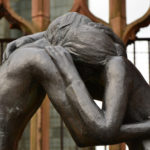We run our website the way we wished the whole internet worked: we provide high quality original content with no ads. We are funded solely by your direct support. Please consider supporting this project.

A Brief Theology of Faith
It is often argued that Hebrews 11:1 provides us with a clear definition of faith. The NIV translates it as, “Now faith is confidence in what we hope for and assurance about what we do not see.” Most of the times when we use different translations of the Bible, the differences between them are about the nuances of meaning. But with this verse, the different ways two Greek words can be translated can give this “definition” a very different meaning. Let me explain.
A very literal translation of this passage reads, “Now faith is [the] substantiating of things hoped for, [the] conviction of things not seen.” (Darby). The KJV also provides another literal reading, “Now faith is the substance of things hoped for, the evidence of things not seen.”
The Greek word translated as “substantiating” or “substance” is hypostasis. Two verses later, in Heb 1:3, this word is used to refer to a thing’s “essence” or “substance.” Now, the word was sometimes used to denote something solid that one could confidently stand or lean on, so most modern versions translate hypostasis as “being sure”, as “confidence”, or as assurance”. Unfortunately, by identifying a feeling of confidence as the essence of faith rather than the substance that gives confidence, these translations reinforce a certainty-seeking model of faith.
The Greek word that is translated as “conviction” by Darby is elegchos., On the one hand, this word can refer to “evidence,” as it’s found in the KJV and the Webster Bible, with the connotation that this “evidence” leads to a particular conviction. On the other hand, elegchos can refer to the “conviction” that is based on evidence. A variation of this word is used in 1 Timothy 3:16 when Paul claims that Scripture is useful for (among other things) “rebuking” (elegmos). Paul is saying that Scripture can be used as the evidence by which a teacher brings conviction on another person. Since it’s not clear how faith could function as the “evidence” of things not seen, many modern translators agree with Darby and translate elegchos as “conviction”.
Unfortunately, however, some modern translations further reinforce certainty-seeking faith by specifying the kind of “conviction” that the author is talking about as the feeling of being “certain”, or even worse, as “knowing”, “convinces” or even as “proof”. So far as I’ve been able to discern, while elegchos signifies a sense of confidence, in this context, I’m convinced it stops short of a feeling of certainty. On the contrary, I’m convinced that the examples of faith that follow in Hebrews 11 preclude the suggestion that faith involves a feeling of certainty.
If we translate hypostasis as “substantiating” or “substance,” rather than a feeling of confidence, that is a result of standing or relying on something solid, and if we translate elegchos as simply a “conviction,” with the connotation that it is a conviction that arises from evidence, then it’s easy to discern in this passage that faith involves embracing a vivid vision of an anticipated future that in turn gives rise to a compelling conviction that moves us toward that future.
We exercise faith when we imaginatively represent, as a substantial reality, something in the future that we believe to be God’s will. And just as evidence produces a conviction in a person, our imaginative representation produces in us a confident motivation to do what is necessary to bring this imaginative representation into reality.
This is illustrated by the heroes of the faith listed in Hebrews 11. The author writes, “All these people were still living by faith when they died. They did not receive the things promised; they only saw them and welcomed them from a distance” (vs 13). Note the visual imagery in the faith these heroes exercised. They were “looking for a country of their own” (vs 14), and were “longing for a better country—a heavenly one” (vs 16). They imaginatively envisioned “the city with foundations, whose architect and builder is God” (vs. 10), and therefore they lived as foreigners and vagabonds in this world.
These heroes of faith were looking for, and saw, something they could not physically see. They were “substantiating” an anticipated future. And their imaginative, real-seeming vision produced a “conviction” of longing in them, which is what motivated them to sacrifice all this world had to offer to remain faithful to the One who called them as they moved forward into an uncertain future.
Contrary to those that translate elegchos as “certain,” these heroes of faith couldn’t have been certain they would receive what they longed for, for as a matter of fact, “none of them received what had been promised” by they time they died. Yet, they were “all commended [by God] for their faith” (vs 39).
Faith is not about striving for certainty. It’s about striving to remain faithful in the midst of uncertainty. We exercise this faith by imaginatively embracing God’s promises as a substantial reality (hypostasis) that in turn creates a conviction (elegchos) that it will be so, which motivates us to act in ways that we hope will bring what we imaginatively envision into reality.
—Adapted from Benefit of the Doubt, pages 210-213
Photo credit: Simon Schmitt via Unsplash
Category: General
Tags: Doubt, Faith, Kingdom Living
Topics: Following Jesus
Verse: Hebrews 11:1
Related Reading

12 Reasons for Keeping the Kingdom of God Separate from Politics, Part 2
Image by the justified sinner via Flickr Satan is the “god of this age” (2 Cor 4:4) and “ruler of the world (Jn 12:30; 14:31) who “controls the entire world” (1 Jn 5;19) and possesses all the power of “all the kingdoms of the world” (Lk 4:6). While governments are ordained by God to preserve…

Paul Teaches Free Will, Not Determinism: Romans 9, Part 3
In this series of posts, I am challenging the deterministic reading of Romans 9, which interprets Paul’s teaching as saying that God chooses some to be saved and others to be damned. There are six arguments that I offer to challenge this popular view. Today, I will look at the fourth. Argument #4: Paul’s Summary and…

Beyond Theoretical Salvation
Profession of Christ’s lordship in our lives isn’t a magical formula. It’s more than a theory about how we can get saved if we confess the right doctrines. The confession has meaning only when it’s understood to be a genuine pledge to surrender one’s life to Christ. (See yesterday’s post.) But I want us to…

How We Are Defined
Burstein! via Compfight Zack Hunt wrote a piece called Abortion, Gay Marriage, Immigration, Gun Control, and the Church over at A Deeper Story. He points out that we have a big problem on our hands when it comes to the ways we have come to be defined by these issues. Christians are primarily defined in…

The Suffering of God
NYC.andre via Compfight This seems like a good follow-up post from what Greg posted yesterday. Charisma posted this reflection on the problem of evil and the suffering of God. It’s a great summary of our thinking about what accounts for the kind of world we see where tragedies like Newtown occur. From the article: C.…

The Coming Kingdom & Racial Conflict
In the book of Revelation, we see a glimpse into the future. John says he saw, …a great multitude that no one could count, from every nation, tribe, people and language, standing before the throne and in front of the Lamb. They were wearing white robes and were holding palm branches in their hands. And…
